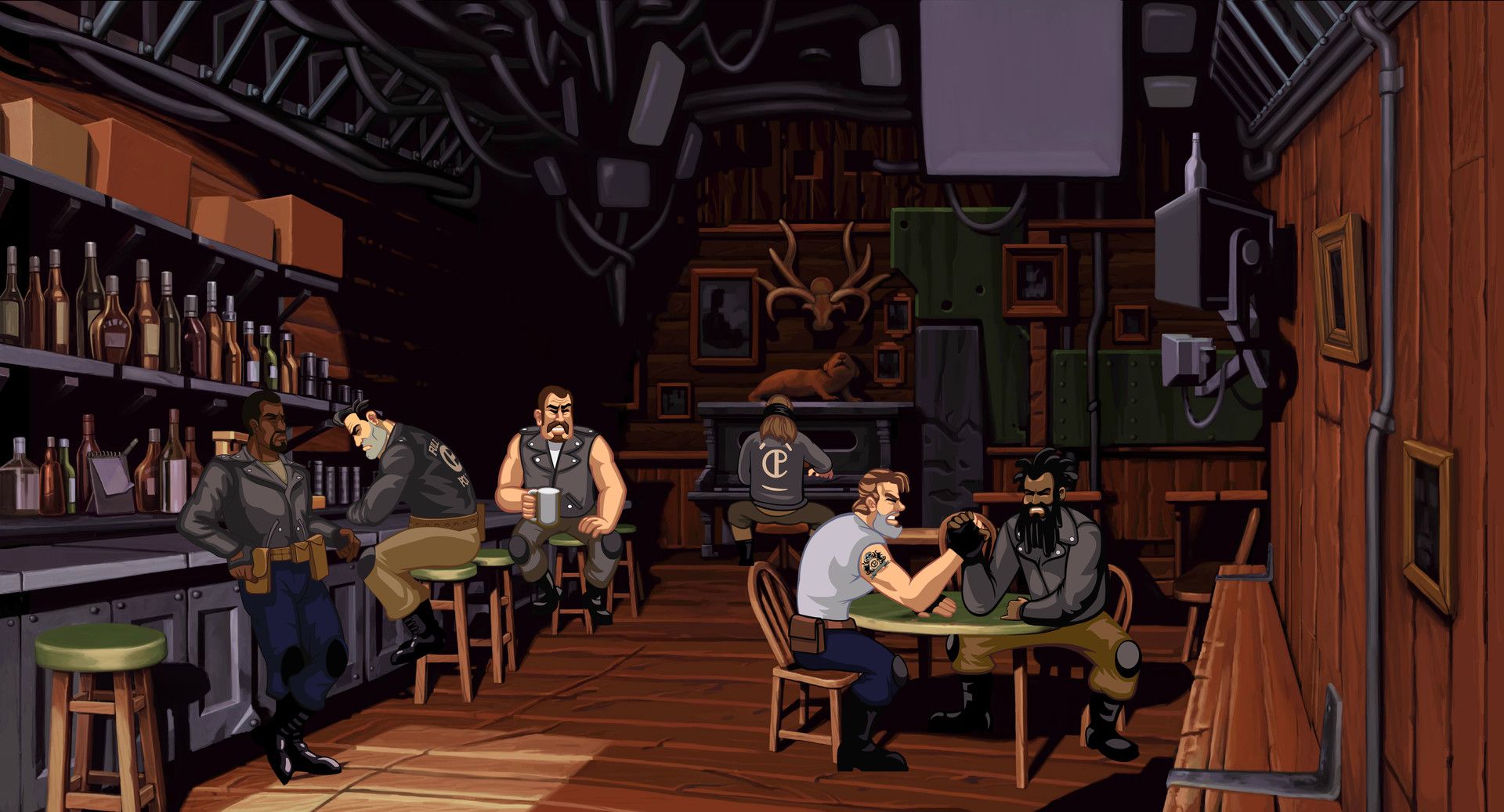Full Throttle is not a point-and-click adventure: it's a point-and-kick adventure. Rock-jawed biker hero Ben is not one of those puny adventure game protagonists who uses their wits to solve problems. Characters like Monkey Island's Guybrush Threepwood, Broken Sword's George Stobbart, and Day of the Tentacle's Bernard Bernoulli make up for their lack of physical prowess by flexing their intellect—approaching puzzles in ingenious, elaborate, and usually comically absurd ways. Ben, on the other hand, is a practical, hands-on kinda guy. He's a big, burly, road-hardened biker with a frame that looks like it was carved out of oak. If something gets in his way he'll introduce it to his boot.
Full Throttle is a classic '90s LucasArts adventure, dreamed up, written, and designed by Tim Schafer. The first project he was ever the lead on, in fact. It's lighter on puzzles than other beloved pointy, clicky games of the era, but big on action, atmosphere, and memorable characters. As has become a Schafer staple, the game mixes humour, pathos, and genre storytelling to great effect, spinning a compelling yarn while simultaneously making you laugh and warming your heart. Ben is a hardass who loves booze, punch-ups, road battles, and terrorising motorists, sure. But he has a heart of gold too. The bad guys in Full Throttle aren't the bikers: it's the stuffed shirts of soulless corporate America.
Full Throttle launched for the PC in 1995—arguably the golden era of graphic adventures. Schafer's script was inspired by Mad Max and Akira Kurosawa films, while lead artist Peter Chan took inspiration from the shadowy, silhouette-heavy art of Hellboy creator Mike Mignola. It was a dream combo, and the result is one of the adventure genre's sharpest, funniest, and best-looking games. Schafer convinced LucasArts to take a gamble on the project, and it paid off big time. These kinds of games usually sold 100,000 copies, but Full Throttle sold a million. It was a real blockbuster game, which is evident almost immediately when your screen is filled with one of the most exciting intros in video game history.
A shiny corporate limo rides along a desert highway, before being surrounded by the roar of a dozen chromed-out, gas-guzzling motorcycles. 'Legacy' by The Gone Jackals—the game's de facto theme song—plays as Ben rides over the top of the limo, smashing its gilded hood ornament, making it clear what he thinks of this kind of fancy-pants lifestyle. It's a wonderfully directed cutscene, and a masterpiece of scene-setting and establishing tone. You know instantly what kind of person Ben is and what his gang, the Polecats, stands for. The scuzzy rock of The Gone Jackals (an authentic biker band) is complemented brilliantly by a dusty, Western-tinged score by longtime Schafer collaborator Peter McConnell.
One of the occupants of that gleaming hover-limo turns out to be Malcolm Corley, CEO of the last motorcycle manufacturer in the country. A series of unfortunate events leads to Ben and the Polecats being framed for his murder. Worse still, he learns that the company is abandoning bike production entirely to refocus on mass producing hover-minivans. For a biker, that's not just an inconvenience—it's the end of a way of life. The end of the world. It's a gripping premise, and like everything else in Full Throttle, ties directly into the fact that this is a biker adventure. The major existential threat in this story isn't a ghost pirate, an evil wizard, or a sinister global conspiracy: it's capitalism.
Full Throttle is not strictly a post-apocalyptic game, but it has the feel of one. The barren desert setting, long stretches of highway, mohawk-sporting rival bikers, and generally melancholy, downbeat vibe have all the hallmarks of the genre. This isn't a society that has collapsed, but we're very much on the fringes of the so-called 'civilised' world. A harsh, dangerous, oil-slicked realm of outlaws, criminals, drifters, and gangs swinging chainsaws at each other. It's one of the most vivid and richly painted settings in the LucasArts library (which is saying something), and I often find myself replaying the game just to be there. There are a few nice quiet moments that let you explore and absorb the place at your leisure.
Full Throttle is short-lived and the puzzles aren't great, but it makes up for these shortcomings in every other respect. The voice acting, script, score, background art, characters, atmosphere—all sublime and seemingly immune to the passage of time. I've played Full Throttle dozens of times over the years and it's every bit as entertaining as it was the first time I booted it up in DOS back in '95. If you pick up 2017's excellent remaster, I recommend playing with the original art and the remastered voice acting. Double Fine's 4K paintovers are beautiful and lovingly handled, but the pixel art of the OG release is still unbeatable. It also teaches you a valuable life lesson: got a problem? Kick it. Kick it real hard.






